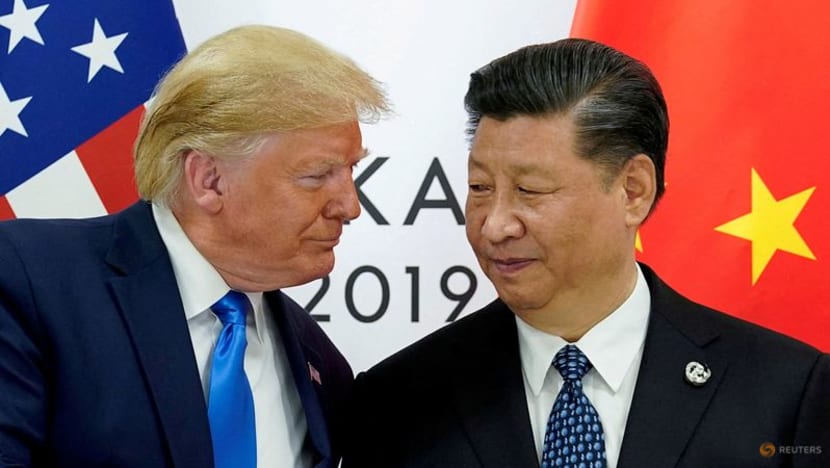World
Trump Hints at TikTok Deal After Call with Xi, Raises Concerns

After a phone call with Chinese President Xi Jinping on September 19, 2024, United States President Donald Trump expressed approval of the ongoing negotiations regarding TikTok, although specific details remain unclear. The Chinese account of the conversation, however, did not confirm a finalized deal. Reports from Chinese media suggest that President Xi welcomed business negotiations that align with market rules and Chinese law, hinting at a softer stance from Beijing compared to previous opposition to a forced sale of the popular video-sharing platform.
Details emerging from US officials indicate that if the agreement is confirmed, ByteDance, TikTok’s Chinese parent company, could retain less than a 20 percent stake in the platform’s American operations. This arrangement would comply with a US law enacted in 2024 requiring that TikTok not be “controlled by a foreign adversary” to avoid a ban. Trump has extended the deadline for ByteDance to divest its stake until December 16, 2024. Should the deal proceed, American companies would own over 80 percent of TikTok, with tech giant Oracle and investment firms Andreessen Horowitz and Silver Lake Technology Management likely to secure ownership stakes.
Concerns regarding national security remain prominent in discussions surrounding the agreement. Any finalized arrangement must adhere to legal requirements aimed at enhancing national security by mitigating risks associated with ByteDance’s potential access to US user data. Reports suggest that US data will be stored separately on Oracle servers in Texas in a project known as “Project Texas.” Users in the United States might have to download a separate app to access TikTok’s services.
The algorithm that drives TikTok’s functionality remains a critical issue. ByteDance may retain ownership of the algorithm but license it to the US version of TikTok, allowing US engineers to manage its operations. Some lawmakers have raised concerns about whether such an arrangement would comply with the law, which stipulates no operational ties to ByteDance.
The implications of this potential deal extend beyond business operations. The TikTok board in the US may include a government appointee, reflecting the Trump administration’s broader efforts to influence media. The appointment of loyalists to oversee TikTok operations aligns with Trump’s previous actions, including attempts to control media narratives and pressure critics.
This trend is evident in Trump’s administration’s ongoing efforts to exert pressure on media outlets. For instance, in August, the Republican-controlled Congress halted federal funding for National Public Radio, which Trump has accused of exhibiting bias against conservatives. Additionally, the indefinite suspension of late-night comedian Jimmy Kimmel‘s show on ABC after his remarks regarding Trump has raised eyebrows.
Federal Communications Commission (FCC) Chair Brendan Carr warned that media companies could face consequences if they do not conform to desired conduct, suggesting potential regulatory repercussions. While ABC’s decision is a corporate one, the pressure exerted by government officials raises significant concerns about freedom of the press.
Trump’s critiques of media coverage and his numerous lawsuits against various news organizations, including the Wall Street Journal and The New York Times, reflect his aggressive posture towards those who question his actions. He has sought damages amounting to $15 billion from The New York Times for perceived defamation during the election campaign.
As the Trump administration navigates these issues, there is a growing sentiment among some Republican figures, including Senator Ted Cruz, that the tactics employed to influence the media could backfire. Cruz described the threats made by Carr as “unbelievably dangerous,” suggesting that such actions might ultimately silence conservatives.
In the context of these developments, it is vital to recognize the historical precedent that power dynamics can shift over time. The current administration’s attempts to consolidate control over media narratives and platforms may not align with the principles of free speech they profess to defend. The implications of these actions could have lasting ramifications for the political landscape in the United States as debates surrounding media influence and regulation continue.
-

 World5 months ago
World5 months agoSBI Announces QIP Floor Price at ₹811.05 Per Share
-

 Lifestyle5 months ago
Lifestyle5 months agoCept Unveils ₹3.1 Crore Urban Mobility Plan for Sustainable Growth
-

 Science4 months ago
Science4 months agoNew Blood Group Discovered in South Indian Woman at Rotary Centre
-

 World5 months ago
World5 months agoTorrential Rains Cause Flash Flooding in New York and New Jersey
-

 Top Stories5 months ago
Top Stories5 months agoKonkani Cultural Organisation to Host Pearl Jubilee in Abu Dhabi
-

 Sports4 months ago
Sports4 months agoBroad Advocates for Bowling Change Ahead of Final Test Against India
-

 Science5 months ago
Science5 months agoNothing Headphone 1 Review: A Bold Contender in Audio Design
-

 Top Stories5 months ago
Top Stories5 months agoAir India Crash Investigation Highlights Boeing Fuel Switch Concerns
-

 Business5 months ago
Business5 months agoIndian Stock Market Rebounds: Sensex and Nifty Rise After Four-Day Decline
-

 Sports4 months ago
Sports4 months agoCristian Totti Retires at 19: Pressure of Fame Takes Toll
-

 Politics5 months ago
Politics5 months agoAbandoned Doberman Finds New Home After Journey to Prague
-

 Top Stories5 months ago
Top Stories5 months agoPatna Bank Manager Abhishek Varun Found Dead in Well









